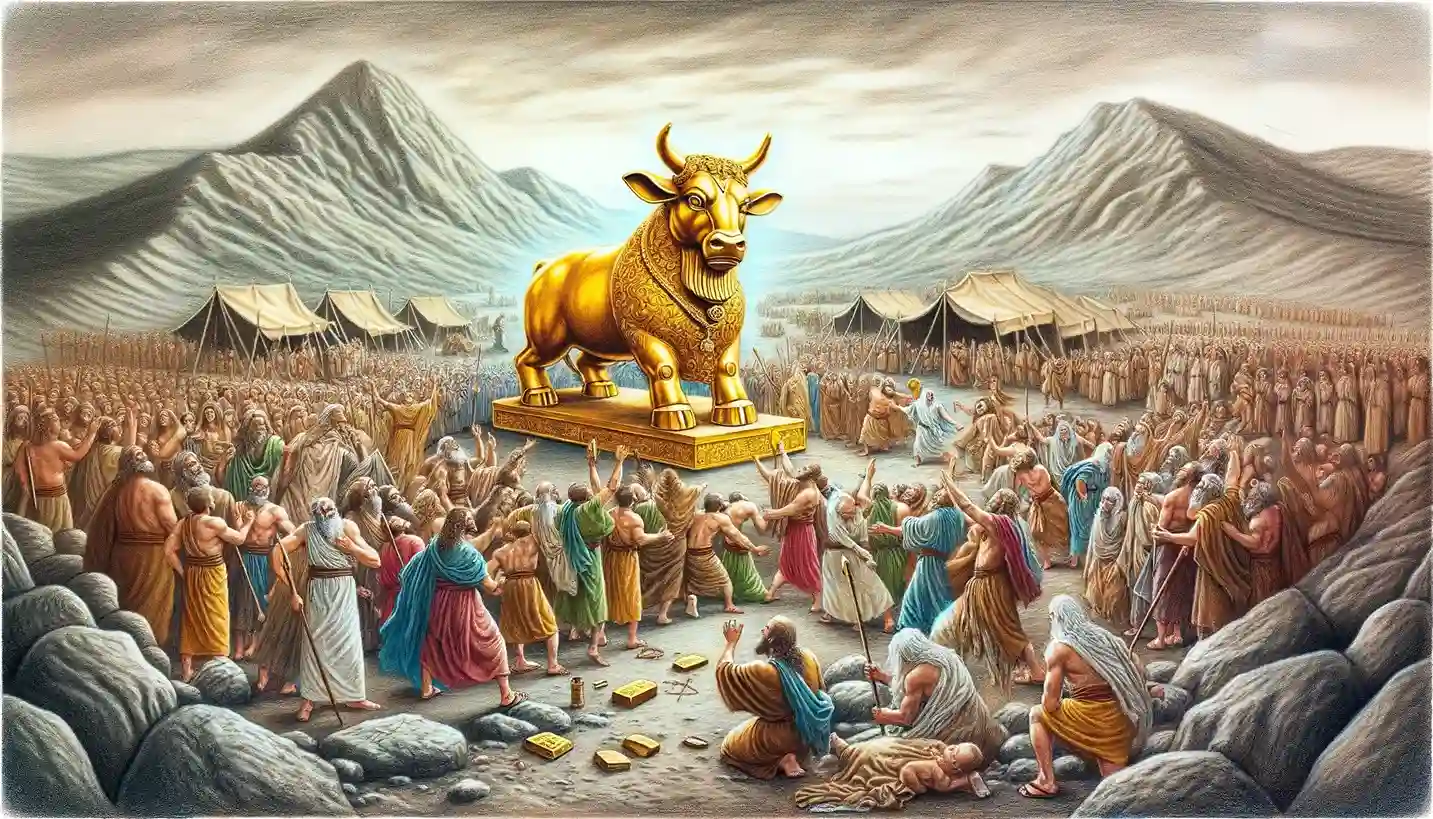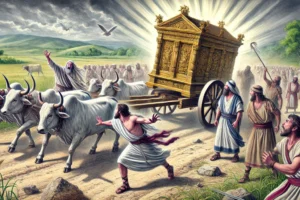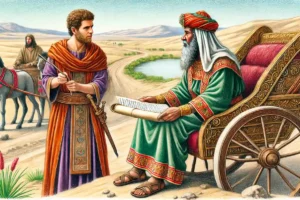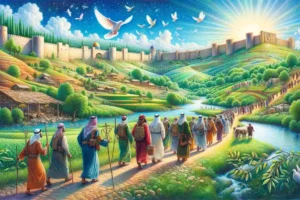
Golden Calf Incident
The Golden Calf Incident is one of the most infamous events in the history of the Israelites, described in the book of Exodus. This event highlights the Israelites’ disobedience to God and the consequences of idolatry.
Quick Facts
- Biblical Reference: The Golden Calf Incident is detailed in Exodus 32.
- Context: Occurs while Moses is on Mount Sinai receiving the Ten Commandments.
- Creation of the Calf: Aaron, Moses’ brother, crafts the calf from the Israelites’ gold jewelry.
- Idolatry: The Israelites worship the calf, proclaiming it as their god who led them out of Egypt.
- Moses’ Reaction: Upon returning, Moses breaks the stone tablets in anger.
- Divine Judgment: God threatens to destroy the Israelites but relents after Moses’ intercession.
- Punishment: The Levites kill about 3,000 men as part of God’s judgment, and God sends a plague.
The Golden Calf Incident, recorded in Exodus 32, serves as a profound lesson on the dangers of idolatry and the importance of faithfulness to God. This event takes place shortly after the Israelites’ exodus from Egypt, while Moses is on Mount Sinai receiving the Ten Commandments directly from God.
Context and Creation of the Calf
The Israelites, newly freed from Egyptian bondage, are encamped at the base of Mount Sinai. Moses ascends the mountain to commune with God, leaving Aaron and Hur in charge. However, Moses’ prolonged absence (forty days and nights) leads to anxiety and impatience among the people. Fearing that Moses might not return, they approach Aaron with a request: “Come, make us gods who shall go before us. As for this Moses, the man who brought us up out of the land of Egypt, we do not know what has become of him” (Exodus 32:1, ESV).
Aaron, perhaps succumbing to pressure or fear, instructs the people to bring him their gold jewelry. From these, he fashions a golden calf, a symbol commonly associated with strength and fertility in various ancient cultures. The people then proclaim, “These are your gods, O Israel, who brought you up out of the land of Egypt!” (Exodus 32:4, ESV). This declaration is a blatant violation of the first two commandments they had recently received: to worship no other gods and to make no idols.
Moses’ Reaction and Divine Judgment
Meanwhile, God informs Moses of the people’s transgression and expresses His wrath, contemplating their destruction: “Now therefore let me alone, that my wrath may burn hot against them and I may consume them, in order that I may make a great nation of you” (Exodus 32:10, ESV). Moses, displaying his role as an intercessor, pleads with God to relent, appealing to His promises to Abraham, Isaac, and Jacob, and arguing that the Egyptians would misinterpret God’s actions.
God relents, and Moses descends the mountain with the two stone tablets. Upon seeing the revelry and idolatry, Moses’ anger mirrors God’s. He throws down the tablets, breaking them, symbolizing the broken covenant. He then takes the calf, burns it, grinds it to powder, scatters it on the water, and makes the Israelites drink it—a potent symbol of the bitter consequences of their sin.
Moses confronts Aaron, who offers a feeble defense, blaming the people and minimizing his role. Moses then stands at the camp’s entrance and calls for those who are on the Lord’s side to join him. The Levites rally to him, and at Moses’ command, they execute about 3,000 men, purging the community of the sin. The next day, Moses returns to God to seek atonement for the people’s sin, acknowledging its severity.
Theological Insights and Lessons
The Golden Calf Incident underscores several key theological insights:
- The Nature of Idolatry: Idolatry is not merely the worship of physical idols but represents a deeper spiritual infidelity. The Israelites’ quick turn to the calf, despite their recent experiences of God’s power, reveals a recurring human tendency to seek tangible representations of the divine, especially in times of uncertainty.
- Leadership and Responsibility: Aaron’s failure to stand firm against the people’s demands highlights the responsibilities of leadership. Effective leaders must guide their followers towards faithfulness, even under pressure. Moses’ actions, contrastingly, exemplify strong leadership, characterized by zeal for God’s holiness and a willingness to intercede on behalf of the people.
- Divine Justice and Mercy: The incident demonstrates the balance of God’s justice and mercy. God’s initial intent to destroy the Israelites is tempered by Moses’ intercession, reflecting His willingness to forgive. Yet, the ensuing punishment, including the plague, affirms that sin has serious consequences.
- Covenant Relationship: The breaking and subsequent renewal of the tablets signify the fragile yet enduring nature of the covenant between God and His people. Despite their failures, God remains committed to His promises, offering restoration and continued relationship.
- Intercession: Moses’ role as mediator prefigures Christ’s ultimate mediation for humanity. His willingness to offer himself for the people’s atonement (Exodus 32:32) parallels Christ’s sacrificial intercession.
In conclusion, the Golden Calf Incident serves as a powerful reminder of the perils of idolatry, the importance of faithful leadership, and the enduring mercy of God. It calls believers to steadfastness in worship and trust in God’s covenant promises.



